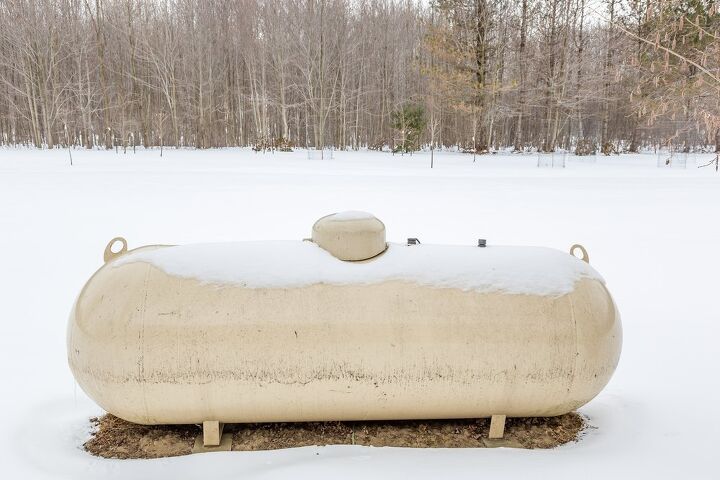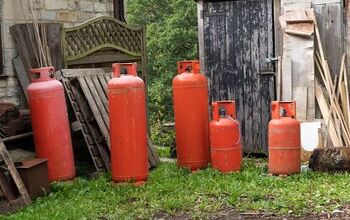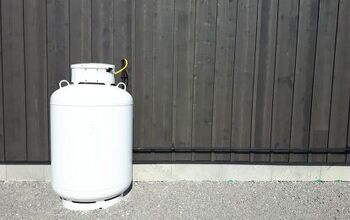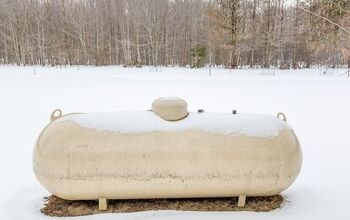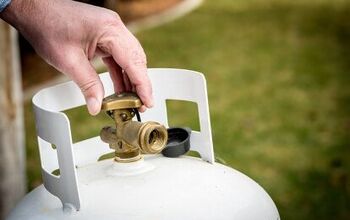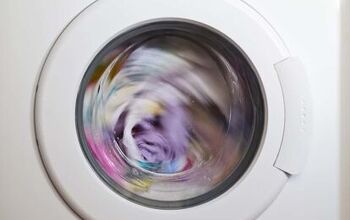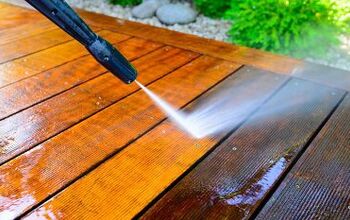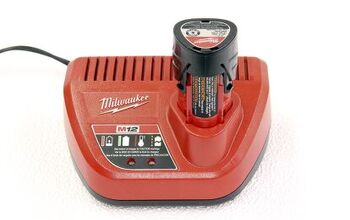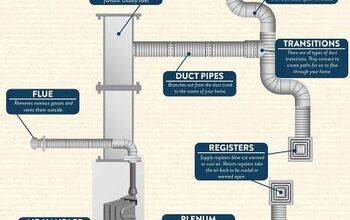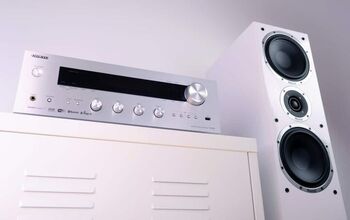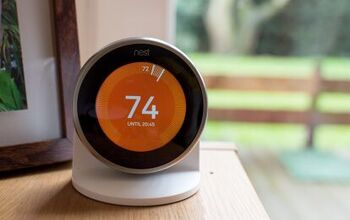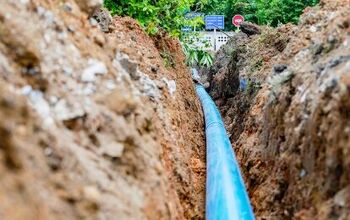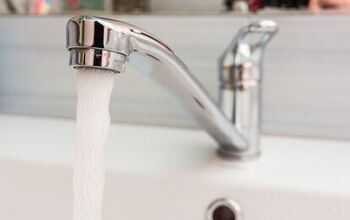Why Do Propane Tanks Freeze? (Find Out Now!)

Propane is a safe and reliable energy source when used correctly. But outdoor conditions and other factors can lead propane tanks to freeze or fail to function. So why exactly do propane tanks freeze, and how can you keep your tank from doing so?
In general, propane tanks freeze when their vapor withdrawal rate is greater than their liquid conversion rate. Freezing usually occurs when propane tanks are covered in snow, exposed to cold temperatures, or under 30% full. If your propane tank freezes, you should stop using it immediately and give it time to warm up.
Do You Need Water or Fuel Tank Installation or Replacement?
Get free, zero-commitment quotes from pro contractors near you.

What Is A Propane Tank?
Propane tanks are essentially storage containers for liquid propane. They’re engineered to contain propane at high pressures, and they’re available in various sizes. Propane tanks are typically installed at the customer’s location, and then they’re filled on-site.
What Is Propane?
So what is propane, exactly? It’s a mixture of natural gas and refined petroleum, and it’s a flammable gas. However, it’s most often used as bottled fuel. Natural gas on its own isn’t compact or transportable, but propane is.
What Is Propane Used For?
This makes propane the ideal energy source for items like fire pits, space heaters, water heaters, and propane grills. It’s also great for indoor and outdoor lighting fixtures.
What Does Propane Look Like?
When propane comes out of the tank, it’s in its gaseous form and has no smell. However, inside the propane tank, it’s stored as a liquid.
If it were to be stored as a gas, it would take up too much space. In fact, gas propane is 270 times larger than liquid propane! The propane inside a propane tank actually looks very similar to water.
Do Propane Tanks Freeze?
When you use a propane tank, vapor is drawn from the top of the tank through a burning process. The liquid propane sits in the lower part of the tank and releases replacement vapors as vapor is drawn out. Then the propane absorbs the heat from the walls of the tank.
This causes propane vapor to be released to the top of the tank. At that point, it’s ready to be used to power your appliances.
Sometimes, the external walls of your propane tank might freeze. This happens when the vapor withdrawal rate is greater than the liquid conversion rate. The liquid propane demands more warmth and tries to get it from the walls of the tank.
However, the ability of propane to draw heat is directly related to the ambient temperature outside the tank. It also reflects the amount of surface touching the liquid propane inside the tank. Therefore, when this happens, the external walls of your propane tank can freeze and be covered with ice.
Why Do Propane Tanks Freeze Up?
We’ve talked about propane tanks freezing in the literal sense. But what about propane tanks “freezing up” and failing to work?
Like most materials and substances, propane contacts when it’s cold. So when the temperature is very low outside, the propane in your tank will shrink. This shrinkage results in a loss of pressure.
When the pressure inside your propane tank becomes too low, the propane cannot reach the gas burner. Unfortunately, this means that you won’t be able to run any appliances that are powered by propane. This phenomenon of “freezing up” can become quite a problem in extremely cold weather.
Related Guide: Why Is My Propane Tank Freezing?
How To Keep Your Propane Tank From Freezing
There are a few different ways that you can ensure your propane tank won’t freeze. First, make sure to keep your propane tank at least 30% full. The more propane you have in the tank, the more positive pressure, and the less likely it will freeze.
Watch The Weather
You should also keep an eye on the weather forecast. Note any upcoming cold weather. During the colder months of the year, check your propane tank gauge regularly. It’s also a good idea to schedule a propane delivery just in case.
Keep It Clear
In addition, if you live in an area where snow is common, don’t let it build up on your propane tank. Keep your tank clear so that sunlight can reach it and keep it warm. However, you don’t want to put your propane tank in direct sunlight.
Turn Down The Thermostat
Another tip is to turn down your thermostat. This will result in your boiler or furnace running less often. When you do this, the pressure inside your propane tank will be able to build up once again.
Stop When You See Ice
If you see ice on the outside of your propane tank, stop using it immediately. Allow some time for the tank to absorb heat from the air. You’ll know it has absorbed enough heat once the ice is gone.
Propane Tank Safety Tips
Overall, propane tanks are very safe when used properly. Be sure to follow these safety tips to make the risk of accident or injury as small as possible!
What Is The Safest Way To Handle A Propane Tank?
First and foremost, you never want to use a portable propane tank in any kind of living space. Even storing a propane tank in your basement or any other indoor area is not recommended.
If you ever need to transport a propane tank, always be sure to secure it properly. You don’t just want to throw it in your backseat or the bed of your truck! And once you reach your destination, never leave the propane tank in a car or any closed vehicle.
If you’re using a temporary propane tank to build heat or cook, always secure it in place. When connecting a propane tank to an appliance, you should always contact a qualified propane service technician. Unless you have the knowledge and experience necessary, it’s best not to connect the tank to the appliance yourself.
What Is The Proper Way To Use Propane Gas Appliances?
It should go without saying that you should never use a propane gas barbecue grill indoors. In addition, it may sound like a propane stove or oven would be a good stand-in for a space heater. But this should be avoided as well.
Any time you want to connect an appliance to a propane tank, contact a qualified propane service technician. They can connect the appliance safely and perform a leak test.
Don’t let your propane tank run out of propane. This can be dangerous if an appliance valve or gas line is also left open. When this happens, it can lead to a leak.
It’s best to schedule a regular delivery with your propane supplier. That way, you’ll never have to worry about your tank running out of propane.
What Should I Do If I Smell Gas?
If you smell gas, the first thing you need to do is extinguish any open flames or smoking materials. Make sure everyone leaves the area where the suspected gas leak is taking place. If it’s safe to do so, turn off your propane tank’s gas supply valve.
Once you’ve completed these steps, get away from the leak and call your propane supplier. If you can’t get a hold of them, call 911. Then, do not return to the area unless your propane supplier or emergency responders say it’s safe to do so.
Before trying to use your propane appliances after the leak, be sure to get your system checked. Either your propane supplier or a qualified service technician can check your entire system. They’ll ensure that it’s completely leak-free and safe to use.
Should You Install A Propane Gas Detector?
There are some situations in which you might not smell a propane leak. For example, if there’s rust, air, or water, in your propane tank, it can reduce the concentration of the odor. Or, if the propane leaks underground, its smell might be reduced as it passes through the soil.
Propane gas detectors really come in handy in situations like the ones described above. These detectors have been designed to sound an alarm anytime they sense the presence of propane. It’s recommended to install one or more propane gas detectors.
Who Needs A Propane Gas Detector?
Detectors are especially recommended for those who aren’t able to smell propane. Or perhaps you have appliances in areas of your house that aren’t often visited. This means you wouldn’t be likely to smell propane in the case of a leak. In this case, you should install a propane gas detector.
Plus, detectors provide peace of mind and an additional security measure for you and your family.
Once you’ve installed your propane gas detectors, maintain them as recommended by the manufacturer. Even if you’re able to install the detectors yourself, you should have a qualified service technician inspect them regularly. To truly err on the side of caution, you can also install a carbon monoxide alarm.
Do You Need Water or Fuel Tank Installation or Replacement?
Get free, zero-commitment quotes from pro contractors near you.

Related Questions
Are propane tanks safe?
Propane tanks are generally safe and reliable as an energy source. As long as they are used properly, there is very little risk involved with propane tanks. Be sure to store your propane outdoors, upright on a flat area.
Your propane tank should be at least 10 feet away from any flammable materials. Keep it out of direct sunlight as well. Finally, disconnect your propane tank from the grill or other appliance when you’re done using it.
Are propane tanks heavy when full?
Most propane tanks weigh about 17 pounds when empty and about 37 pounds when full. Overall, they’re not extremely heavy.
Why do propane tanks explode?
If a propane tank explodes, it’s usually due to a propane leak. Technically, the propane tank is not exploding, however, but rupturing and bursting.

With a lifelong passion for writing plus strong enthusiasm for home improvement and DIY projects, joining the team at Upgraded Home was an easy choice. Jessica Allen likes to share helpful information with current and aspiring homeowners. Aside from writing, Jessica loves doing yoga, playing the piano, and dabbling in graphic design.
More by Jessica Allen



